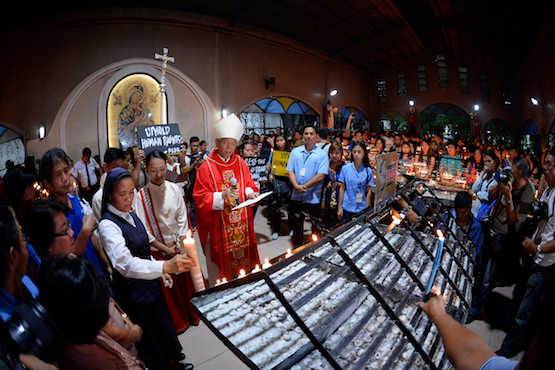
Auxiliary Bishop Broderick Pabillo of Manila leads a prayer for respect for life and human rights at the height of calls for the revival of capital punishment in the country and the spate of summary executions. (Photo by Maria Tan)
A Philippine legislator quoted saints and the Bible to justify the death penalty as plenary debates for the revival of capital punishment for heinous and drug-related crimes heat up in Congress.
Deputy Speaker Fred Castro, a lawyer, quoted St. Thomas Aquinas to support arguments to press for the passage of the controversial measure.
"[I]f a man be dangerous and infectious to the community, on account of some sin, it is praiseworthy and advantageous that he be killed in order to safeguard the common good," Castro quoted St. Aquinas' Summa Theologica.
The legislator argued that the Catholic saint and theologian supported the killing of a criminal "if this is necessary for the welfare of the whole community."
Castro, an ex-officio member of the House Committee on Justice said, "criminals are having a field day" because of the absence of capital punishment.
House Speaker Pantaleon Alvarez, the principal proponent of the bill, appealed to legislators to be reasonable and refrain from employing dilatory tactics to stall the passage of the measure.
"Let's all be reasonable, we debate extensively, but at the end of the day, we need to vote for it," he said, adding that it is the "essence of democracy" that the majority prevails.
Alvarez denied allegations that the House leadership is rushing the passage of the measure.
The restoration of the death penalty is one of the campaign promises of President Rodrigo Duterte to deter crime.
Catholic teaching
Cardinal Luis Antonio Tagle of Manila issued a statement on Feb. 2 forwarding arguments advanced by Catholic Church leaders against the proposed measure.
He said studies around the world show that the death penalty has not lessened violent crimes.
"The best approach is to address positively and comprehensively the roots of crime of which offenders have probably been victims themselves," said the cardinal.
Among the "roots" he cited are a loss of moral values, injustice, inequality, poverty, lack of access to food, education, jobs and housing, proliferation of weapons, drugs, pornography, and a loss of respect for sexuality.
He said the church and the state "need to protect and strengthen the basic unit of society, which is the family."
Cardinal Tagle also warned that the death penalty "might legitimize the use of violence to deal with every wrongdoing," saying that victims of crimes need "justice and healing."
"We need to reform institutions so they would safeguard justice while preventing the spread of a culture of violence," he said.
Flawed justice system
Human rights groups and families of victims of abuses also voiced their opposition to the proposal in Congress.
"The death penalty is essentially a legislative fiat to the current spate of extrajudicial killings … which will mostly affect the poor who have far less or no access to resources to defend themselves before courts," said Cristina Palabay, secretary-general of rights group Karapatan.
She said under a flawed justice system the death penalty is a "violation of the right to life and the absolute prohibition of torture and other cruel, inhuman or degrading treatment or punishment."
Palabay said the death penalty will also impact on human rights defenders, activists and political dissenters, when those in power to "criminalize the exercise of political beliefs and political actions."
She noted that almost all political prisoners have been charged with trumped up criminal offenses such as murder, kidnapping, and even drug-related charges that are punishable by death in the proposed measure.
Karapatan reported that at least 249 out of the 392 political prisoners were charged with "fabricated murder charges” and were arrested and detained through "alias warrants."
Evangeline Hernandez, chairwoman of the group Hustisya, said her organization opposes the restoration of the death penalty because it will "not give justice nor is it a deterrent to crimes."
Hernandez, whose daughter Benjaline Hernandez was killed by state forces in 2003, said the restoration of the death penalty will only bring about more victims than render justice.
"If the state cannot prosecute those who wronged the people because they are in position or in power, who then will suffer and be sentenced with death penalty? Only the poor will become victims again," she said.
Senators vow to kill the measure
Several members of the Philippine Senate vowed to stop the passage of the proposed measure.
"I am against death penalty, I will vote against it, and I will convince others not to support it," said Senator Francis Escudero, adding that strict implementation of laws will address the problem of criminality.
At least nine senators have vowed to vote against the re-imposition of the death penalty.
Senator Francis Panglinan of the Liberal Party said re-imposing the death penalty "will not lead to more convictions, nor will it ensure that cases will be decided swiftly and the guilty punished."
"It is swift punishment and the immediate disposition of cases pending before our courts, regardless of penalties involved, and not the re-imposition of death penalty, that will restore respect for the rule of law," he said.
The Philippines placed a moratorium on capital punishment in 2001 and five years later downgraded the sentences of 1,230 death-row inmates to life imprisonment in what Amnesty International described as the "largest ever commutation of death sentences."


